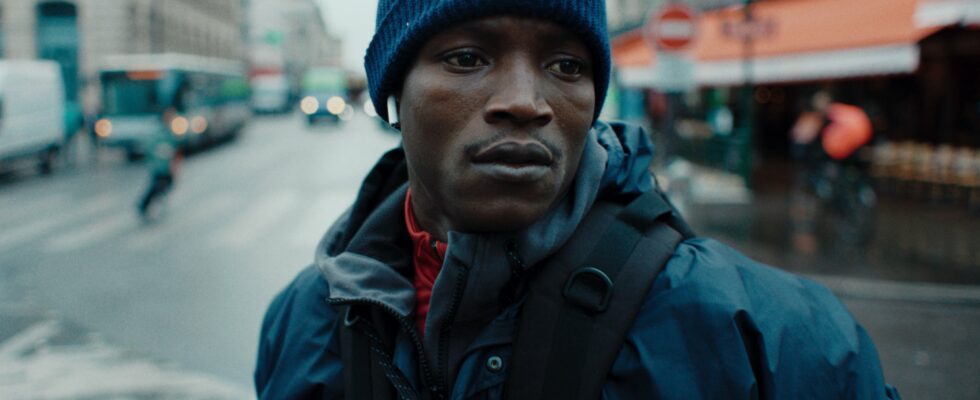First of all, he is handsome, powerful, athletic, but his sport, cycling in this Olympic Paris, is not a game: he is a deliveryman. From those who take all the risks to bring crappy pizzas to idiots who don’t have the patience to make a good omelette with onions, button mushrooms, and three slices of chorizo since they love chorizo so much. Didn’t have time to buy two tomatoes at the local Carrefour that they would have cut into quarters, three grains of salt, a drop of olive oil, is it that complicated? No, it’s the pleasure of having it delivered, having that childish joy of receiving like a gift this cardboard box with this lukewarm and sluggish dinner. And perhaps to have been polite, possibly generous with the delivery man, Souleymane, or odious, it is the same power, the same social domination.
Souleymane’s bicycle races in Paris, at night, in the rain, among cars, all the risks he takes to deliver as many disgusting pizzas as possible on time, to earn enough to pay the bastard who sold him a pseudo scheme to enable him to obtain asylum, the holy grail, when I see that, in the cinema, in Boris Lojkine’s film, The Story of Souleymane, and while I can’t stand these bikes that climb the sidewalks, go red, and I can even have fun with them whenever the opportunity arises, well I congratulate myself on having always had indulgence, and even a form of compassionate anger towards these guys who, although they are not all as beautiful, touching, revolting as Souleymane, are nonetheless outcasts, the wretched of the earth, convicts of hunger, people ready for anything, violent people, it’s possible too.
This is not the case for Souleymane, given the patience he has with this bitch who slams the door in his face because the delivery bag is wet; Obviously, Souleymane was hit by a car, his fault or not, his bike is half broken, his shoulder too, but he got up, and go ahead, deliver anyway, and she refuses to sign for him the order, plus she denounces it via the application. We imagine her on her cell phone, typing in rage because the bag was wet and having to push away Souleymane, this six-foot-tall Guinean, who she will find very handsome when she goes to see him at the cinema , but who scared her, with his accent, his dripping raincoat, so ticked the “not-at-all-satisfied” box. Which blocked Emmanuel’s account.
Stunning interpretation
Because Souleymane works secretly for Emmanuel, who is not called Emmanuel at all, it’s the exploitation of the wretch by someone more wretched than himself, this accumulation is too much, I wanted to leave the room after ten minutes. Is it the fear of appearing like a horrible middle-class person who is fed up with being told about all the misery in the world that has kept me seated, or professional duty, or worse, the opportunity to do penance?
I didn’t like watching this movie. It is painful, revolting to see this reality, the injustice, the social violence, painful to endure it as a spectacle, and without the filter of fiction, the filter of a love story… precisely, it ends up happening , after an hour of gymkhana in Paris. This is where it becomes a film, and Souleymane human, contradictory, moving without pity, and I’m not talking about the end, when he goes before the review board of his case of pseudo political refugee that he is not. not.
There, it’s the actor, Abou Sangare, the one who triumphed at Cannes where he won, in the Un certain regard category, the prize for interpretation, indeed astonishing, the interpretation of this almost himself, but not him at all, in fact, his story is the opposite. Abou Sangare has a real job as a mechanic, he likes it, repairing cars, but since it’s been seven years (he arrived in France at 15, one hand in front, one hand behind), he would just like to have a residence permit in due form. Who will film the story of Abou Sangare, the real one?
.
